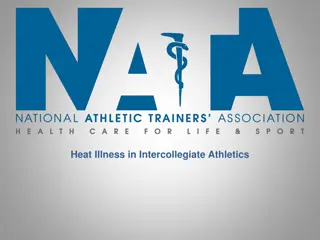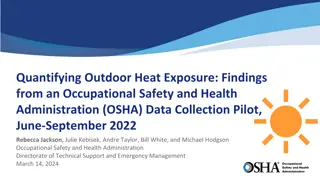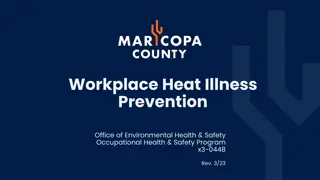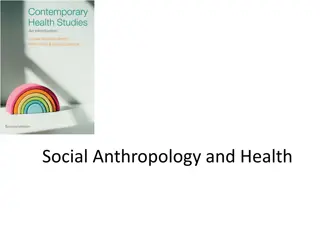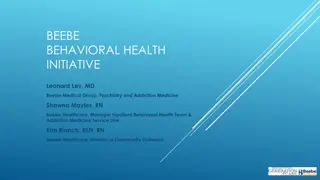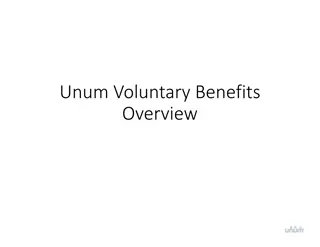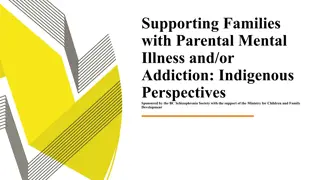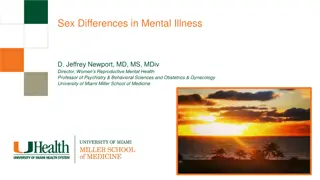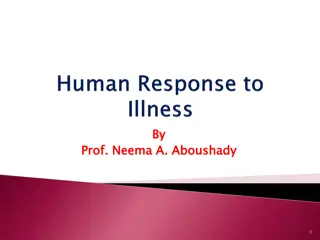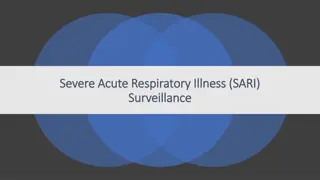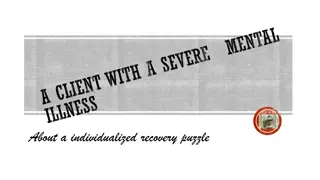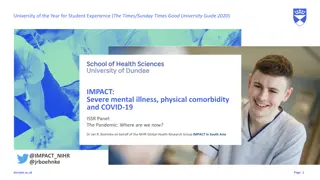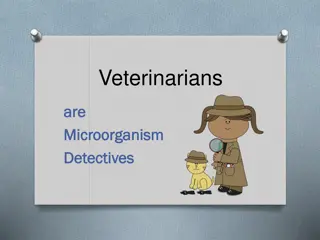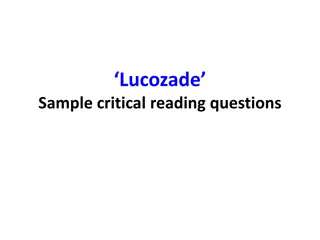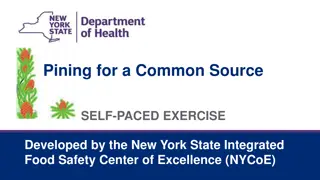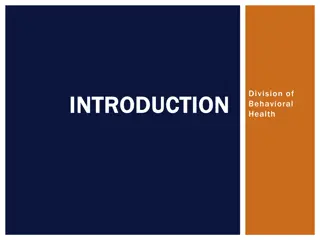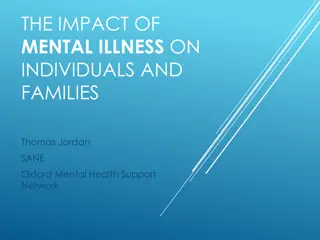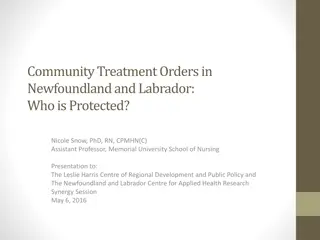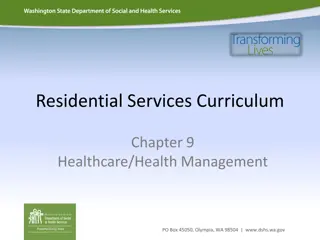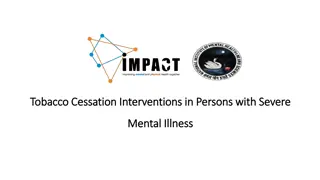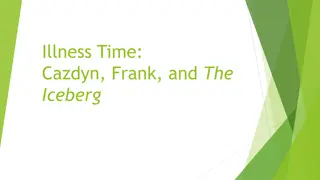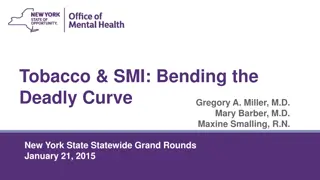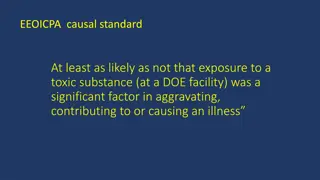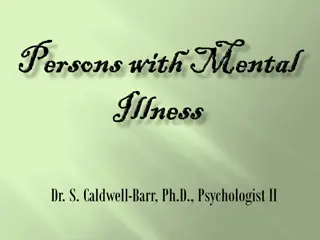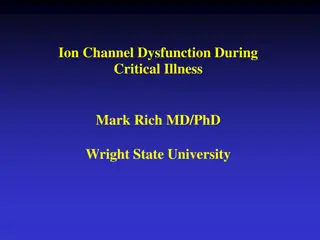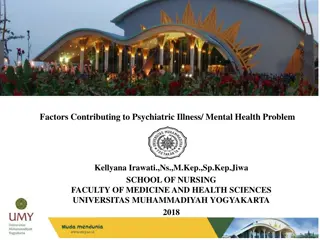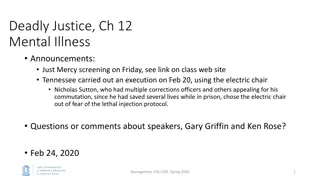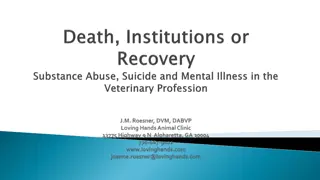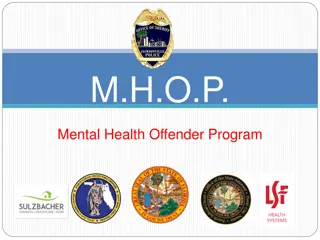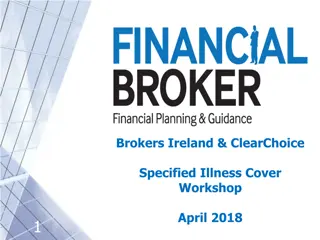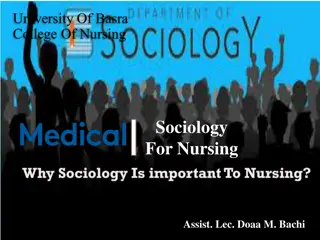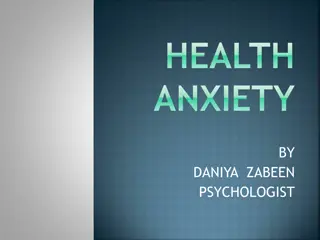Acknowledgement of Country
Acknowledging the impact of mental illness in legal settings, this content delves into identifying mental disorders, communicating effectively, and the importance of recognizing mental health issues. It highlights the prevalence of mental disorders in court-involved individuals, the criteria for men
3 views • 11 slides
The History of NAMI and the Family Movement
Founded in 1977 by two mothers seeking support for loved ones with mental illness, NAMI (National Alliance on Mental Illness) has grown to be a leading grassroots organization advocating for mental health awareness, support, and education. The Contra Costa chapter, NAMI CC, has a rich history of pro
1 views • 15 slides
Understanding Mental Health vs. Mental Illness
Explore the nuanced differences between mental health and mental illness, where mental health pertains to the quality of mental and emotional wellbeing for everyone, while mental illness refers to diagnosable conditions with long-term effects that do not affect everyone in the same way. Gain insight
9 views • 18 slides
Prevention and Treatment of Heat Illness in Intercollegiate Athletics
Learn about exertional heat illness prevention strategies, identification of predisposed athletes, and treatment approaches for heat cramps and heat exhaustion in intercollegiate athletics. Proper hydration, acclimatization, education, and monitoring are crucial for athlete safety during high heat s
1 views • 10 slides
Insights on Outdoor Heat Exposure: OSHA Data Collection Pilot 2022
The Occupational Safety and Health Administration (OSHA) conducted a Data Collection Pilot from June to September 2022 to quantify outdoor heat exposure and assess employer heat illness prevention programs. Key findings include identifying elements of successful prevention programs, comparing workpl
0 views • 22 slides
Workplace Heat Illness Prevention Program Overview
This workplace heat illness prevention program overview discusses risk factors, how the body handles heat, types of heat illness, prevention strategies including water consumption and shade, importance of acclimatization, emergency response procedures, OSHA standards, job and personal risk factors,
0 views • 28 slides
Understanding the Intersection of Social Anthropology and Health
Social anthropology investigates the cultural and social dimensions of health, providing insights into how illness and medical care are shaped by cultural contexts. This discipline explores the impact of culture on individual health, highlighting how collective beliefs influence perceptions of healt
0 views • 20 slides
Beebe Behavioral Health Initiative Overview
Beebe Behavioral Health Initiative focuses on integrating behavioral health services into primary care settings to improve access and quality of care for individuals facing mental illness and substance use disorders. The initiative includes collaborative patient-centered care, stigma reduction, and
0 views • 6 slides
Unum Voluntary Benefits Overview
Voluntary Benefits offered by Unum provide unique financial protection by paying cash benefits directly to individuals for various medical expenses, regardless of existing insurance coverage. Employees have quick access to claims processing and can use the benefits for a wide range of expenses while
0 views • 14 slides
WSP UK Ltd. Premises Risk Assessment Summary Oct 2021
This document outlines the results of the Premises Risk Assessment conducted by WSP UK Ltd. post-COVID-19. It includes information on office arrangements, commuting precautions, illness mitigation protocols, and guidelines for ensuring a safe working environment. Measures such as sanitization, hygie
0 views • 6 slides
Law Enforcement's Response to Mental Health Crisis Intervention
Law enforcement agencies have established Emotionally Disturbed Persons Response Teams (EDPRT) and Crisis Intervention Teams (CIT) to address mental health crises in the community. These specially trained officers handle situations involving emotionally disturbed individuals, suicidal persons, psych
0 views • 13 slides
Indigenous Perspectives on Supporting Families Facing Parental Mental Illness and Addiction
This event, hosted by the BC Schizophrenia Society with the support of the Ministry for Children and Family Development, focuses on supporting families dealing with parental mental illness and addiction from Indigenous perspectives. It includes discussions on strengthening mental health systems, com
0 views • 10 slides
Understanding Sex Differences in Mental Illness and Its Impact
Exploring various aspects of mental health issues, this content sheds light on sex differences in depression, anxiety disorders, PTSD, and suicide rates. It discusses the age of onset for depression, the prevalence of anxiety disorders, and the challenges individuals face in dealing with mental illn
2 views • 10 slides
Understanding Illness and Disability for Young Learners
This learning module aims to develop young learners' understanding of illness and disability by distinguishing between long-term and short-term illnesses, recognizing various medical conditions, and fostering empathy through discussions and activities. Students will engage in tasks such as listing d
0 views • 18 slides
Nursing Strategies for Emotional Reactions to Illness
In this content, the focus is on understanding the stages of illness and the crucial role of nurses at each stage. It also highlights the patient's emotional needs during illness and the importance of maintaining a positive self-image. Nursing strategies for assisting patients in coping with anxiety
0 views • 8 slides
Managing Physical Health in Severe Mental Illness with a Focus on Diabetes
This educational material presents a comprehensive slide set designed to aid in the management of physical health in individuals with severe mental illness, focusing on diabetes. It includes insights on the challenges faced by healthcare professionals, learning objectives on diabetes management, and
0 views • 14 slides
Surveillance and Monitoring of Severe Acute Respiratory Illness (SARI) for COVID-19
Introduction to the surveillance of Severe Acute Respiratory Illness (SARI) with a focus on COVID-19 cases and clusters. The monitoring of hospitalized SARI cases, identification of unlinked cases, and implementation of control measures to reduce transmission are highlighted. Criteria for defining S
2 views • 11 slides
Innovative Approaches for Individualized Recovery in Severe Mental Illness
Embracing the recovery model for individuals with severe mental illness entails moving away from traditional approaches and focusing on values, shared decision-making, and community support. The hierarchy of needs profiles different levels of specialized services, while measurements include wellbein
0 views • 8 slides
Impact of Severe Mental Illness, Physical Comorbidity, and COVID-19 in South Asia
The research funded by the National Institute for Health Research aims to address the mortality gap and health inequalities faced by individuals with severe mental illnesses in South Asia. The study focuses on improving outcomes for mental and physical multimorbidity, reducing depression and anxiety
0 views • 9 slides
The Case of Loki's Mysterious Illness: A Veterinarian's Detective Work
As a veterinarian, you are tasked with solving the mystery of what is causing Loki's illness. By investigating potential suspects like viruses, bacteria, fungi, and parasites, you must use your detective skills to identify the culprit. Through a thorough examination and analysis, you will uncover th
1 views • 19 slides
Critical Reading of "Lucozade" Poem: Language Analysis and Mood Exploration
The critical reading questions delve into how the language in different stanzas of the "Lucozade" poem creates various moods and conveys the speaker's emotions. The analysis covers the use of imagery, symbolism, and tone to depict solemnity, illness, hospital experiences, and the changing mood of th
3 views • 13 slides
Foodborne Illness Outbreak Investigation Procedures and Protocols
In this self-paced exercise developed by the New York State Integrated Food Safety Center of Excellence, learners will delve into the intricacies of investigating foodborne illness outbreaks. The course covers topics such as identifying outbreak patterns, roles in outbreak investigations, interpreti
0 views • 171 slides
Understanding Involuntary Commitment Criteria for Adults with Serious Mental Illness
Involuntary commitment for adults with serious mental illness is a sensitive issue that involves specific criteria to determine if someone poses a danger to themselves or others. The criteria include having a serious mental illness, being a threat to self or others, or having an inability to provide
0 views • 67 slides
Office of the Ombudsman for the Energy Employees Occupational Illness Compensation Program
The Office of the Ombudsman provides support and information regarding the Energy Employees Occupational Illness Compensation Program (EEOICPA). They assist claimants, attorneys, and others, offering guidance through the claims process and addressing concerns. Their duties include recommending resou
1 views • 28 slides
Understanding the Impact of Mental Illness on Individuals and Families
This presentation delves into the profound impact of mental illness on individuals and families, exploring biological, genetic, chemical, and environmental factors that contribute to mental health struggles. It highlights societal pressures, traumatic experiences, and upbringing influences, shedding
0 views • 10 slides
Mental Health Legislation in Newfoundland and Labrador: A Study by Nicole Snow
This presentation by Nicole Snow explores mental illness, community treatment orders, and mental health legislation in Newfoundland and Labrador. It discusses the prevalence of mental health issues in Canada, the economic burden of mental illness, and the purpose of mental health legislation in prot
3 views • 38 slides
Understanding Signs of Illness and Proper Response in Healthcare Management
Explore common signs and symptoms of illness, learn how Direct Support Professionals should respond when suspecting sickness, and understand the consequences of not addressing signs promptly. Engage in activities promoting preparation, advocacy, and empowerment in healthcare management.
0 views • 30 slides
Tobacco Cessation Interventions in Severe Mental Illness
Individuals with severe mental illness face health and socioeconomic disparities, often compounded by tobacco use. Tobacco is a major contributor to global morbidity and mortality, disproportionately affecting low and middle-income countries. High tobacco prevalence is observed in people with SMI, n
0 views • 37 slides
Reflections on Illness and Time: Crisis, Transformation, and Liberation
Reflections on the complexities of time in the context of illness and crisis are brought forth in the readings of Cazdyn, Frank, and The Iceberg. The narratives delve into the stretching of time during crises, the interplay between chronic time and the threat of relapse, and the ever-present nature
0 views • 14 slides
Understanding the Impact of Tobacco Use on People with Serious Mental Illness
People with serious mental illness are significantly affected by tobacco use, with smoking being a leading preventable cause of early death in this population. This presentation highlights the reasons behind smoking in individuals with mental illness, challenges faced in cessation efforts, and the i
0 views • 12 slides
Understanding Causal Factors in Illness: Toxins, Smoking, and Contributing Causes
Causal standards for illness attribution, toxins' role in disease onset and expression, and the impact of factors like smoking and contributing causes on health outcomes are explored. The distinction between certain and contributing causes, as well as the level of certainty in carcinogen classificat
1 views • 19 slides
Understanding Mental Illness and Disability Rights
This content provides insights into commonly held attitudes and beliefs about mental illness, the American with Disabilities Act of 1990, definitions of mental illness per NRS 433A.115, and interactions with individuals with mental health issues. It also covers misconceptions, the 72-hour hold for m
0 views • 60 slides
Understanding Ion Channel Dysfunction in Critical Illness
An intriguing case study presents a young male with weakness and coma in the ICU following pneumonia and sepsis. Nerve conduction results indicated critical illness myopathy and polyneuropathy, along with cardiac abnormalities. Reduced muscle excitability was attributed to a sodium channelopathy. Th
0 views • 14 slides
Factors Contributing to Psychiatric Illness and Mental Health Issues
Factors contributing to psychiatric illness and mental health problems include predisposing factors such as psychological and biological factors, as well as precipitating stressors like challenging stimuli. Mental health is defined as a state of well-being involving happiness, contentment, and effec
0 views • 15 slides
Understanding Legal Ramifications of Mental Illness in Criminal Justice System
Mental illness presents complex challenges in the criminal justice system, impacting court rulings, constitutional issues, and perceptions of vulnerability. Cases like James Holmes and John Hinckley highlight the intersection of mental health and criminal behavior. Legal standards regarding executio
0 views • 9 slides
Understanding the Intersection of Addiction and Mental Illness in Veterinarians
Explore the profound impact of addiction and mental illness on veterinarians, highlighting the biological and environmental components, the prevalence of serious mental illness, the challenges in seeking mental health help, and the heightened risk of suicide within the veterinary profession. Promote
0 views • 28 slides
Mental Health Offender Program: Addressing Mental Illness in the Criminal Justice System
A pilot program, M.H.O.P., aims to reduce the burden on the criminal justice system by providing pretrial release, personalized care plans, and court supervision for defendants with mental illness. By addressing the needs of the mentally ill, the program strives to break the cycle of criminal behavi
0 views • 21 slides
Enhancing Advising Process for Specified Illness Cover Workshops
Guidance on developing a structured process for advising on Specified Illness Cover, addressing challenges faced by financial brokers in selling and positioning the product. Workshop objectives include client engagement, research, explaining benefits, and product understanding. The content covers ag
0 views • 53 slides
Importance of Sociology in Nursing: Insights and Implications
Sociology plays a crucial role in nursing by examining the societal aspects influencing health and illness, including disease distribution, cultural beliefs, social interactions, and the impact of illness on families. Understanding these factors is vital for healthcare providers to deliver effective
0 views • 10 slides
Understanding Health Anxiety: Causes, Symptoms, and Impacts
Health anxiety, also known as illness anxiety or hypochondria, is characterized by obsessive worry about having a serious medical condition. Individuals with health anxiety misinterpret minor body sensations as symptoms of a severe illness, despite reassurance from medical professionals. This condit
0 views • 16 slides



